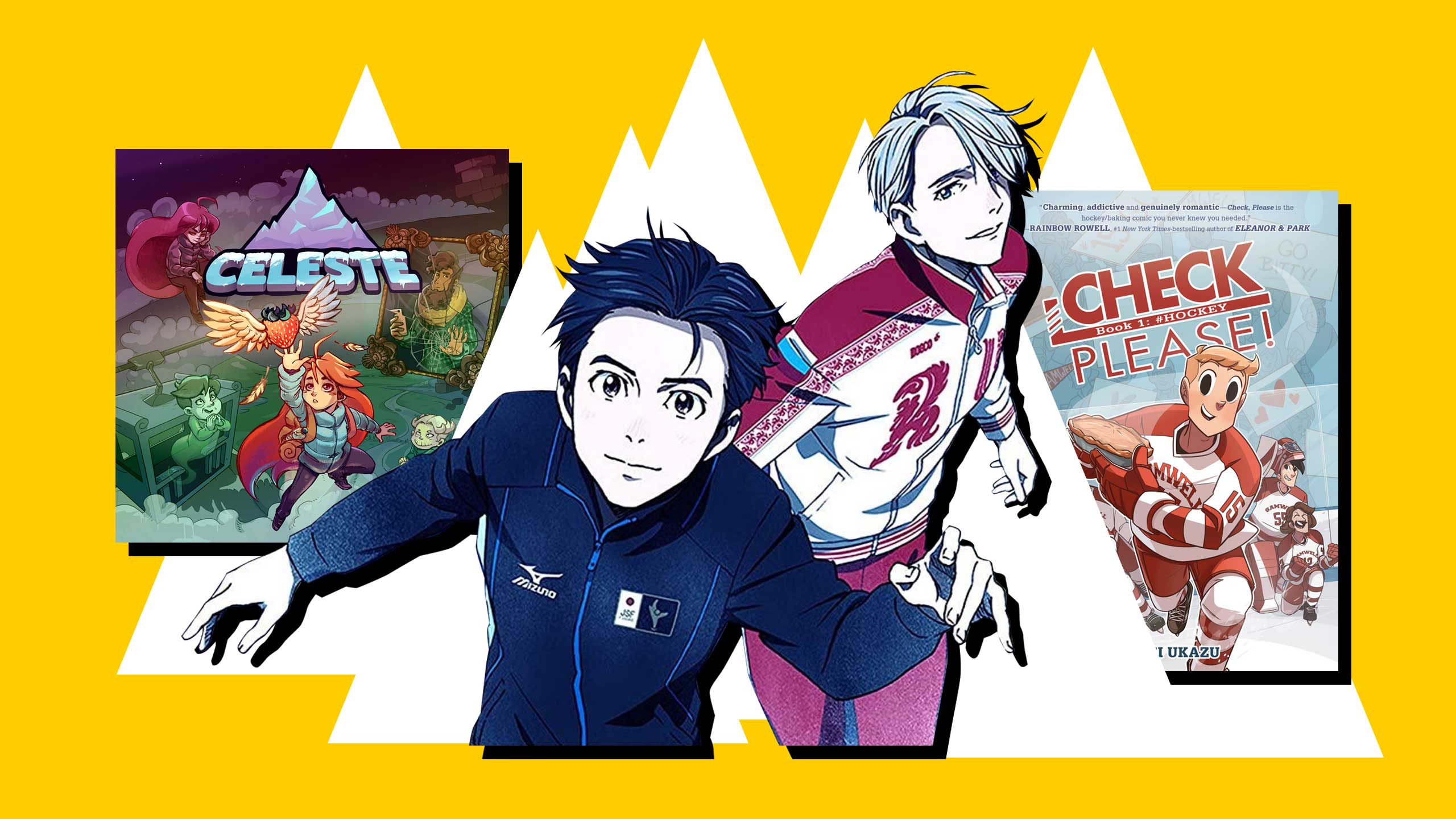The 2022 Winter Olympics are in full swing, featuring a record number of out queer and trans athletes—at least 35 LGBTQ2S+ athletes will be taking to the ice and snow, including U.S. figure skater Timothy LeDuc, the first out non-binary Winter Olympian.
But the Olympics are also rarely free from controversy. This year, they’re being hosted in China—a decision that’s been criticized due to the Chinese government’s human rights record, including the treatment of Uyghurs in Xinjiang, crackdowns on democracy in Hong Kong and a recent increase in anti-LGBTQ+ actions. Not to mention, the Omicron COVID-19 variant has thrown into question whether it’s even safe to hold such a huge international event right now, while the International Olympic Committee has long been accused of prioritizing money over athletes’ well-being.
If you’re not feeling like following the Olympics but still want to appreciate some winter sport drama, you’re in luck. There’s plenty of media that mixes queer stories with athletic prowess. Whether you want to watch, read or play something, here’s a handful of options to embrace the icy spirit in other ways.
Watch: Yuri!!! on Ice
For fans of: Beautiful animation, emotional music, complex relationships
Figure skating is the winter sport that gets the most attention, and it’s easy to see why: incredibly hot people wearing sparkly outfits and performing death-defying leaps sure sounds pretty gay, even if the Olympics continue to heteronormatively insist on only mixed-gendered pairs. Luckily, Yuri!!! on Ice is here to show you what skating would look like if straightness wasn’t the default.
When Yuri!!! on Ice aired in 2016, it felt like a revelation. It’s a sports anime about competitive figure skating, an exploration of anxiety and a love story between two men, Yuri Katsuki and Viktor Nikiforov. It was an immediate hit, winning multiple awards in Japan and abroad for its tender and exciting portrayal of characters you can’t help but root for. It’s also an ideal entry point if you’re interested in watching anime but don’t know where to start.
Yuri Katsuki is 23, and feels like his professional figure skating career is nearing its end. After choking at the world championship, he wonders whether it’s time to retire—until his idol, superstar Viktor Nikiforov, appears (naked, in a hot spring) and offers to be his coach. But then a hot-blooded wunderkid named Yuri Plisetsky turns up and he also wants Viktor to be his coach. These three and their shifting relationships form the core of the show.
As Viktor is helping Yuri Katsuki become a better skater, Viktor’s also helping him realize his value as a person. One pivotal scene has Viktor coaching Yuri to be sexier, telling the younger skater to imagine being a suave ladykiller. But that doesn’t work for Yuri. He struggles, until he decides to instead embody a femme fatale, rolling into town and breaking men’s hearts. Femininity becomes his source of strength.
The show is a love letter to figure skating. The creator, Sayo Yamamoto, hired former professional skater Kenji Miyamoto to choreograph all the routines. Viktor also takes some cues from out American figure skater Johnny Weir, with some of his outfits direct references to Weir’s own performance costumes. Professional ice skaters loved the show: Weir has spoken about his fondness for it, three-time World Champion Evgeni Plushenko consistently posted on social media about the show while it was airing and RuPaul’s Drag Race Season 13 ice queen Denali wore a Yuri-inspired outfit in one of her skating videos.
Sports anime as a genre has long been popular with LGBTQ2S+ fans. The mostly single-gender casts express deep care and affection for each other while striving towards a competitive goal, meaning there are rarely heterosexual love interests. Friendships often involve romantic subtext, whether through authorial intent or fan interpretation. And yet, in most sports animes, openly queer relationships are almost non-existent, being implicit at most.
Yuri!!! on Ice stands out as not just the only gay sports anime show, but as a beautiful piece of queer storytelling. The prequel movie can’t come soon enough. Yuri!!! on Ice is streaming now on Crunchyroll.
Read: Check, Please!
For fans of: College sweethearts, earnest softboys, mixed media storytelling
As a non-Canadian, ice hockey has always been a bit of a mystery to me. It’s lots of people tripping each other over with knives strapped to their feet, and if you break the rules you get sent to the naughty box? It all seems very hyper-masc dude-bro—which is everything that Check, Please! is not.
Ngozi Ukazu’s web comic follows a hockey team at the Samwell University in Massachusetts, which “US News and World Report’s #1 most LGBTQ-friendly campus in America for the last three years.” Our hero is Eric Bittle, a.k.a. Bitty, a cheerful, closeted freshman who loves baking, vlogging and French-Canadian team captain Jack Zimmerman. Bitty spent his youth as a figure skater, and managed to wrangle an athletic scholarship to Samwell to play hockey on the prowess of his skating alone. Now, he just has to figure out how to play the damn team sport.
Check, Please! follows Bitty through his four years of college, as he grows from awkward newbie afraid of getting hit into a bonafide hockey bro. The hockey plot has its fair share of drama—and there’s a whole storyline around why superstar Jack had to drop out of the NHL draft—but, like all good sports stories, the heart is the people on the team. Bitty starts out as the baby of the bunch, and he’s quick to charm fellow players Shitty, Ransom and Holster, while standoffish Jack takes a little longer to warm up. Despite being set in the world of sports, Bitty doesn’t have to deal with homophobia or toxic masculinity from his teammates. And while the story features some heavy themes, most of the problems can be solved with teamwork—or a great slice of pecan pie.
Check, Please! Began in 2013 and ran until 2020. The online comic is divided into years, and then further into multi-page episodes. It also masterfully blends mediums. Some strips are animated. Bitty’s vlogging means he gets to speak directly to the readers as if they were his video audience. Ukazu ran a Tumblr blog for the comic’s duration, allowing her to interact directly with fans, answering questions and providing extra tidbits, as well as a Twitter account for Bitty. That multi-platform approach to storytelling also ties into the story itself, which is part sports, part romance, part coming-of-age, part cooking and part internet creator.
If keeping track of comic strips, in-universe Twitter timelines and extra information seems like a lot, don’t fear: the comic, and its surrounding media, has been compiled into multiple physical volumes. The final book, Check, Please!: Year Four crowdfunded over $500,000 and became Kickstarter’s most funded webcomic project to date. The published volumes have been wildly successful, hitting the New York Times bestsellers lists and netting countless awards for YA graphic fiction.
Play: Celeste
For fans of: Following your journey, finding your truth, getting your ass kicked
Don’t let the pastel colour scheme and adorable pixel art fool you: Celeste is a hard video game. The 2018 platformer follows Madeline, a woman struggling with depression and anxiety who decides to climb a notoriously difficult mountain, Mt. Celeste. Is mountain climbing technically an Olympic sport? No, but there’s a whole host of other equally arduous physical feats, such as 5,000 metre speed skating, hurtling head-first down a twisty course in the skeleton or the obliquely named Nordic Combined (ski-jumping followed by a 10 kilometre cross-country ski race).
And frankly, playing Celeste might as well be a sport. It requires patience, practice and perseverance—but the payoff is worth it.
Celeste is queer in a subtle way. The game’s story is not about Madeline falling in love with someone else and coming to terms with those feelings; instead, it’s about her struggle with herself. Her worst anxieties take a physical form in Badeline, a literal dark reflection of the player character. Badeline does everything she can to halt Madeline’s progress—trapping her and her friend Theo inside mirrors, stalling the mountain gondola, even throwing Madeline off the mountain and forcing her to start again from the bottom. The game’s story revolves around Madeline accepting her anxieties and learning to live with them rather than running away. She treats Badeline with kindness—a reminder that we all need to be kinder to ourselves.
The game has particularly resonated with trans folks. Lena Raine, the composer of the incredible soundtrack, is trans (and also worked on the soundtrack for Steven Universe: The Movie). While making the game, developer Maddy Thorson was also coming to terms with her own gender identity, leading her to now describe herself as a “woman of queer and trans experience.” (She also chose a name based on her own breakout game’s protagonist, which is peak trans energy.)
Celeste makes a lot of sense when viewed through a trans lens, similar to the way audiences now read The Matrix. Madeline is climbing a mountain to prove to herself that she can; she’s pushing through something that she’s afraid of, despite what her depression and anxieties may say, because she has the sense that she’ll feel better once she’s done it. Climbing Mt. Celeste isn’t her running away from her problems—it’s confronting them, accepting that they are part of her and moving onwards with them.
At the very end of the game, there’s a cutscene with Madeline at home. There’s a bottle of pills on her desk that look a lot like estrogen tablets, and both a rainbow flag and a trans pride flag stuck to her keyboard. Thorson confirmed Madeline was trans in a 2020 Medium post, writing, “During Celeste’s development, I did not know that Madeline or myself were trans. During the Farewell DLC’s development, I began to form a hunch. Post-development, I now know that we both are.”
Celeste is available to play on PC, Linux, Mac, Nintendo Switch, PlayStation 4, Xbox One and Stadia.
While all the above titles are fictional, real-world winter sports athletes have also put out their own stories of navigating LGBTQ2S+ identities and sport.
Adam Rippon’s Beautiful on the Outside and Karina Manta’s On Top Of Glass: My Stories as a Queer Girl in Figure Skating are both ice skating autobiographies by Team USA skaters, while freestyle skier Gus Kenworthy stars in issue 16 of Brian Kaminski’s thirst-inducing photobook series At Home. And if you’re a fan of a different kind of pretty pictures, cartoonist Tillie Walden’s Spinning is a comic memoir based on her teen hobbies of ice skating and kissing girls.
Whether you’re invested in the sports or the queer hotties behind it, you’re sure to find your heart racing.


 Why you can trust Xtra
Why you can trust Xtra


